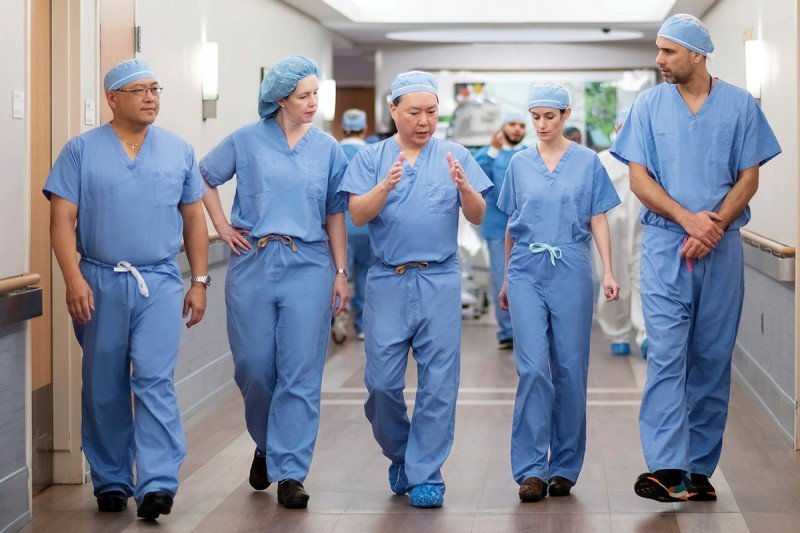
In its 2019–2020 listing of the nation’s best hospitals, U.S. News & World Report ranks Memorial Sloan Kettering as number one for gynecology. This recognition of excellence reflects the dedication and expertise MSK brings to people with cervical cancer, endometrial cancer, and ovarian cancer, including pioneering many advances that today are the standard of care. Find out why MSK stands out at improving outcomes and preserving quality of life for people with gynecologic cancers.
1. Highly-Skilled Surgeons and Oncologists Who Specialize Exclusively in Gynecologic Cancers

MSK has a team of about 50 highly specialized doctors dedicated solely to the treatment of gynecologic cancers. This includes surgeons, medical oncologists, radiation oncologists, radiologists, and pathologists who collaborate closely. “We meet every week to consult on the details of every complex diagnosis and to decide on the best treatment,” says Nadeem Abu-Rustum, Chief of the Gynecology Service.
Doctors at MSK perform among the largest number of gynecologic cancer procedures in the world, making us the best at treating even the most difficult cases. For example, MSK’s ovarian cancer surgery team is the first in the nation that’s dedicated to managing advanced ovarian cancer. This group specializes in removing advanced disease that has spread beyond the ovaries. The team is especially skilled in radical debulking surgery. In this procedure, doctors remove as much tumor tissue as possible to boost the effectiveness of chemotherapy in reaching and destroying ovarian cancer.
“Ninety percent of women with advanced ovarian cancer at MSK are optimally debulked. This means that the amount of tumor remaining after the procedure is very small — less than 1 centimeter in diameter,” Dr. Abu-Rustum explains. “More important, 70% have all visible tumor removed. Studies at MSK and around the world show that removing this volume of cancer tissue has led to improved survival for patients.”
2. Methods for Speeding Recovery and Preserving Quality of Life
MSK pioneered a way to reduce the number of lymph nodes removed during surgery for early-stage cervical and endometrial cancers. Rather than taking out a large number of lymph nodes to make sure that the cancer has not spread, doctors use a technique called sentinel lymph node mapping. The approach removes fewer nodes and greatly reduces the risk of leg lymphedema. This common, often debilitating side effect involves swelling and skin changes. Sentinel lymph node mapping “has been rigorously studied. It has been shown that there is no difference in survival between the historical surgical approach and sentinel node mapping,” Dr. Abu-Rustum says. “It is a huge benefit if more women can be spared unnecessary lymph node removal and the resulting side effects.”
In addition, MSK surgeons often use minimally invasive methods, such as laparoscopic and robotic surgery, which involve keyhole-size incisions, resulting in less pain and blood loss, a shorter hospital stay, and a faster recovery. Surgeons now do many procedures at the Josie Robertson Surgery Center, a state-of-the-art facility for short-stay cancer surgery. Patients return home to complete their recovery as soon as possible — either the same day or the next.
3. Access to a Range of Clinical Trials and New Treatments
Clinical trials can offer people with gynecologic cancers access to treatments that are not widely available elsewhere. Currently, MSK is conducting 35 clinical trials for women with gynecologic cancers, testing new drugs and drug combinations, surgical approaches, and strategies for preserving quality of life during and after treatment. One especially active field is immunotherapy. MSK scientists and doctors played a leading role in developing immunotherapies that have transformed the treatment of melanoma, lung cancer, and other cancers. Now this therapeutic approach is giving new hope to people with gynecologic cancers.
The ovarian cancer team is also running clinical trials on the use of heated intraperitoneal therapy (HIPEC) for certain people with advanced ovarian cancer. In HIPEC, heated chemotherapy is given directly in the belly at the end of surgery.
In addition, MSK researchers are at the forefront of research that could soon impact gynecologic cancer care. This includes investigating whether many ovarian cancers start developing in the fallopian tubes and whether removal of those tubes could prevent the disease. Other researchers are looking for ways to understand and treat lymphedema. MSK is the only cancer center with a dedicated lymphedema laboratory focused on understanding and treating this debilitating condition.
4. Genetic Testing to Guide Treatment and Assess Risk
Many of MSK’s recent gynecology patients have benefited from a powerful diagnostic test called MSK-IMPACT™. This test provides essential genetic information about a tumor that doctors can use when making a diagnosis and considering treatment options. In some cases, the test results may identify women who are candidates for a clinical trial. With MSK-IMPACT, MSK doctors can offer the best treatment for each person.
The Clinical Genetics Service guides people who may be at a higher risk for a gynecologic cancer due to inherited genetic mutations, such as the BRCA mutations. This includes risk assessment, genetic counseling, and genetic testing.
5. Programs to Preserve Fertility and Sexual Health
MSK’s Adult Survivorship Program offers an array of services to help preserve fertility and sexual health in women undergoing treatments for gynecologic cancers. And MSK surgeons have pioneered ways to remove cervical tumors while retaining the uterus, so women preserve the option to have children later. The surgical team has done more than 200 such operations, called radical trachelectomy, and many of these women later had children. “The success rate with this approach is very high. MSK is now a referral center for young women with uterine cancer who want to maintain their fertility,” Dr. Abu-Rustum says.



